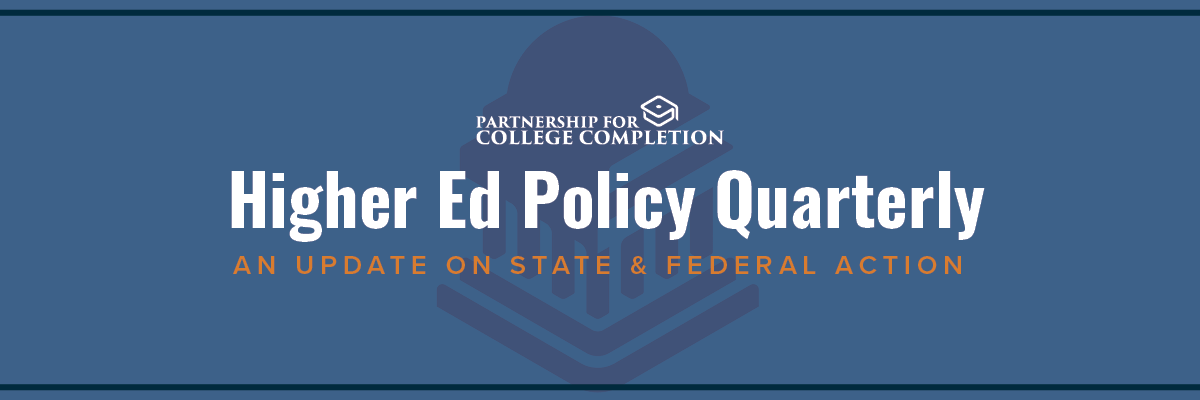
Letter from Senior Policy Manager Emily Goldman
If our newsletter had a theme this month, it’s optimism. Optimism stemming from the Governor’s proposed higher education budget that includes a historic $122M increase in need-based aid. If the legislature adopts this recommendation, fewer eligible students will be denied a MAP grant, putting a postsecondary degree within reach for thousands more students. Optimism stemming from the equity-centered policies moving through the General Assembly, like HB4265 (B.Hernandez) which requires all college documents to offer students the option to select “non-binary” when identifying gender and SB3032 (Fine-Murphy) which would end the practice of transcript withholding. And at the federal level, optimism that the U.S. Department of Education will bring back Obama-era accountability and institutional quality regulations as part of its negotiated rulemaking process, improving protections for students often preyed upon by for-profit colleges.
It is with this sense of optimism that I am proud to be sharing PCC’s 2022 Policy Agenda. Over the last five years the Partnership has prioritized action to catalyze institutional and systems-level change and pushed the state to commit to not just increasing college completion in the state, but to do so equitably. The three principles outlined in the updated Policy Agenda will help guide the continuation of this critical work and set forth a framework for addressing systemic barriers to equity. Through this agenda we will focus our work to ensure:
- Students of all races, economic backgrounds, and geographic locations have access to high-quality higher education;
- Illinois’ public colleges and universities are debt-free for students from low-income families and affordable for all Illinoisans; and
- Institutions are held accountable to equitably serving Illinois students.
Coupled with the implementation of IBHE’s equity-centered strategic plan, the work happening in the Commission for Equitable Public University Funding, and the prospect for significant investments in higher education, the policies associated with each principle will not only increase equitable access, affordability, and accountability, but focus Illinois’ higher education system on serving the evolving needs of its students. As we consider the future of higher education in Illinois, there are so many reasons to be optimistic.
—
Snapshot of Illinois Higher Education Policy
Governor’s Higher Education Budget Proposal
Thank you to everyone who participated in our #MAPMatters campaign! Last week the Governor proposed a historic $122 million increase in the 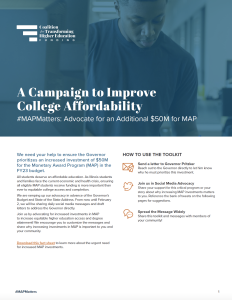 Monetary Award Program (MAP). If the legislature adopts this recommendation, we could see 24,000 more students than last year receive need-based aid and the purchasing power of MAP grants increase to cover as much as 50% of tuition and fees at public universities with the maximum grant award jumping to $8,500.
Monetary Award Program (MAP). If the legislature adopts this recommendation, we could see 24,000 more students than last year receive need-based aid and the purchasing power of MAP grants increase to cover as much as 50% of tuition and fees at public universities with the maximum grant award jumping to $8,500.
Other budget highlights include:
- 5% increase in public university and community college appropriations
- $25 million toward a new pipeline for healthcare workers at community colleges
- $2.3 million increase for the Minority Teachers of Illinois (MTI) program
- Removal of a $230 million unfunded liability for Illinois’ prepaid tuition fund
The Partnership thanks the Governor for his commitment to making college affordable for all. For our full response to the Governor’s FY2023 budget proposal, click here.
Commission on Equitable Public University Funding Meeting 2 Recap
Yesterday, the Illinois Board of Higher Education hosted the second Commission on Equitable Public University Funding meeting. In addition to learning about Illinois’ K-12 Evidence-Based Funding model and Oregon’s equity-based higher education funding formula, the Commission discussed foundational definitions of adequacy, equity, and stability. As members set out to establish common definitions, a theme emerged: In order to improve equity in higher education, the Commission must be specific around the equity goals it hopes to achieve and in defining the student populations it aims to prioritize. If, like Oregon, Illinois aims to increase access and degree completion among Black and Latinx students, it must be race-conscious in both its definitions and its formula recommendations. As it fulfills its role on the Commission, PCC will continue to advocate for a race-conscious model that improves equitable access to higher education and ensures that Illinois’ least-resourced institutions—those serving a higher percentage of Illinois’ Black, Latinx, and students from low-income households—receive the funding they need to adequately serve their students.
SB3151/HB49 – Leveling the Playing Field
Over the last seven months, the Partnership has been convening a group of state and national higher education advocates to identify ways Illinois can improve higher education accountability and student protections. As a result of those conversations, PCC is working with Representative Maurice West and Senator Villanueva on legislation that requires all Illinois degree-granting institutions to spend at least one-third of their tuition and fee revenue on instruction.
The vast majority of colleges and universities spend most of their resources on their students’ education, but a few institutions instead aggressively recruit students while spending little on instruction. This tactic gives these colleges an unfair advantage in recruiting students over institutions that invest in education, and their spending priorities negatively impact students, particularly students from low-income families, students of color, and women.
See our factsheet to learn more and click here to add your name to the list of supporters.
Other State Bills We’re Watching
Now that Illinois legislators are back in Springfield and deadlines are looming, the Partnership is keeping a close eye on higher education state policies. The Illinois Board of Higher Education (IBHE) is proposing statutory changes will help execute the 10-year strategic plan, a Thriving Illinois. The omnibus bill requires all public colleges and universities to submit Equity Plans (like those developed through PCC’s Illinois Equity in Attainment Initiative) to the Board, and recommends private colleges do the same. Additionally, the legislation improves student protections by ensuring institutions are authorized to operate in Illinois, making students aware of fiscal vulnerabilities, and allowing student transcript access in cases of institutional closure. To learn more about IBHE’s proposed legislation, click here.
Other bills we’re tracking include those that could have an impact on equity in higher education, like Representative West’s bill that helps connect students to benefit programs, Representative Barbara Hernandez’ bill requiring discounted commuter benefits for students, and Senator Villanueva and Representative Guzzardi’s bill that improves access to financial benefits for student parents. The Partnership will continue to follow relevant higher education bills as they move through the legislature and share opportunities for action.
—
Snapshot of Federal Higher Education Policy
Biden Administration Takes Steps toward College Accountability
While President Biden’s administration has signaled in its proposed legislation and hiring the potential to step up college accountability measures, reversing years of weakening regulation under the previous administration, this month marked a major step toward taking action on the issue. The federal government began holding negotiated rulemaking sessions in January, and resurrecting gainful-employment regulations will be a topic of discussion at these talks. If re-enacted, gainful employment rules could withhold federal funding for programs that are deemed “failing” on certain metrics, like providing value relative to the debt that students take on. The Trump administration rescinded the rule in 2019, and while these talks are unlikely to end in an agreement on reinstating them, they could be the first step toward doing so.
—
Get to Know Illinois’ Leaders—Deputy Governor Martin Torres
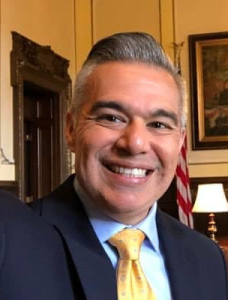
Deputy Governor for Education Illinois Martin Torres has been a champion of education in Illinois for many years, previously serving as First Assistant Deputy Governor for Education in the Office of the Governor of Illinois and as associate director of the Latino Policy Forum, where he guided the Forum’s legislative and administrative advocacy with a focus on education, immigrant integration, and the state budget. At the Forum, he negotiated a significant increase in funding for bilingual education through the transition to an evidence-based funding model for K-12 schools, served as an appointed member of the Illinois Early Learning Council, and partnered with lawmakers to pass legislation that increased transparency surrounding the demographic composition of state boards and commissions.
—
Partnership Launches Redesigned Website, Branding
This January, PCC kicked off 2022 with a refreshed visual presence t0 enhance how it highlights its work and establish a more dynamic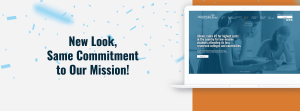 infrastructure for the work ahead. The new website amplifies PCC’s content, improve navigation and accessibility, and provides users more ways to learn about the issues the Partnership’s mission centers and to take action. Visit Partnershipfcc.org to learn more about our public policy efforts, upcoming events, policy positions and more, then visit the site’s new Take Action page, where users can become advocates for equity-centered change in Illinois higher education.
infrastructure for the work ahead. The new website amplifies PCC’s content, improve navigation and accessibility, and provides users more ways to learn about the issues the Partnership’s mission centers and to take action. Visit Partnershipfcc.org to learn more about our public policy efforts, upcoming events, policy positions and more, then visit the site’s new Take Action page, where users can become advocates for equity-centered change in Illinois higher education.
—
- February 15, 2022
- February 24-25
- February 28-March 3, 2022
- March 15
—
SIGN UP & SHARE – 2022 Higher Education Virtual Advocacy Day
Join other higher education advocates on March 9 to raise your voices and urge our state elected officials to support equity-centered higher education policies and investments. Register here to attend this virtual day of advocacy!
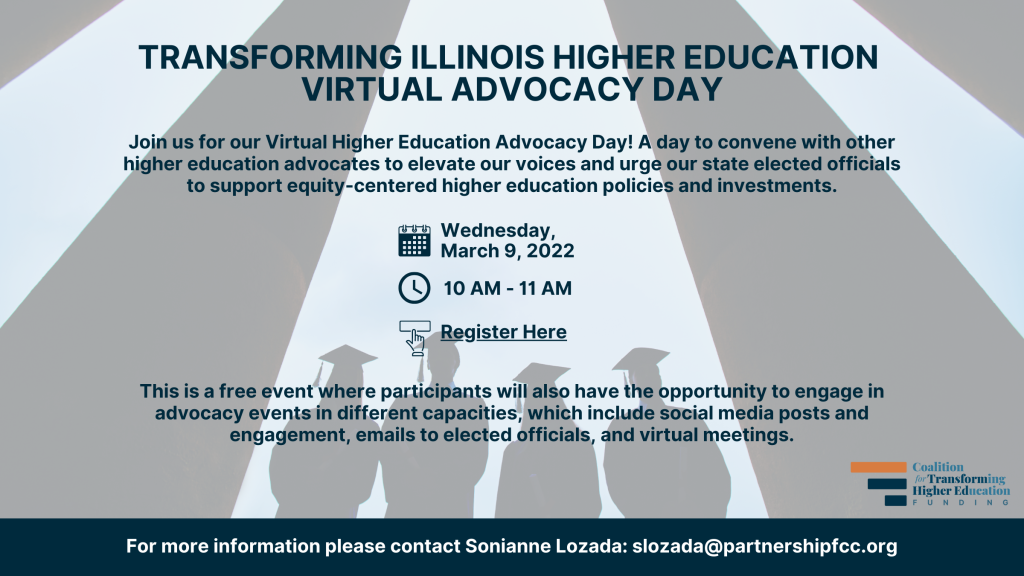
Contact Sonianne Lozada, PCC Community Engagement Manager at slozada@partnershipfcc.org for more information
—

